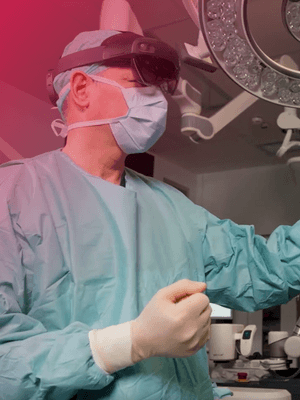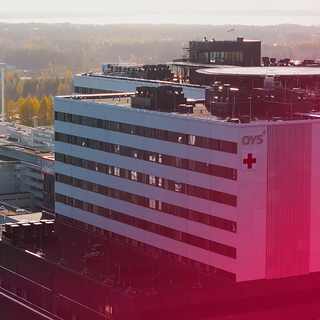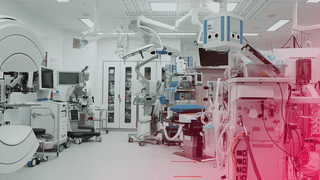Innovation, precision, and the future of patient care
Professor and Head of Neurosurgery, Mikael von und zu Fraunberg, on private 5G innovation and building the world’s smartest hospital at Oulu University Hospital (OYS).
The Hola 5G Oulu project set out to deploy a secure private 5G network, specifically designed to withstand the immense pressures and critical demands of the healthcare environment.
From patient wards to operating theatres, private 5G ensures seamless connectivity and communication, combating inefficiencies and streamlining workflows. It enables OYS to test advanced technology and reinforces the hospital’s reputation as a research and development hub and a leader in technological and medical advancements.
What technology are you powering with the private network?
We’re piloting the use of WICOAR HealthAudio to streamline group communication. Our nurses are now wearing wireless headsets and mobile devices to tune into shared communication channels. It’s already making a big difference - communication is clearer, and access to information is much faster. So far, it’s helping doctors, nurses, and the whole team work more efficiently. Plus, it just makes the environment more enjoyable to work in.
We’re also trialling wireless wearable devices like WICOAR’s HealthVision smart glasses. These let us access all the critical surgical information at a glance. Personally, I’ve found them incredibly useful - they give me everything I need to know in just one look. I really believe this kind of smart technology will transform healthcare. It allows for quicker decisions, greater precision, and ultimately, safer surgeries.
How can we benefit from this technology?
Imagine I'm removing a brain tumour. I can visualise the operating field perfectly, with excellent illumination and magnification. I can see high-resolution brain images and navigate in real time. This allows me to navigate accurately to the tumour using the optimal trajectory. Meanwhile, I can communicate with my surgical staff and, if necessary, seek advice from a remote expert. All of this is enabled by private 5G technology.
AR technology allows me to visualise data directly, replacing the need for lots of screens in the operating theatre. Thanks to wireless technology, we can also prepare the OR much more quickly, which makes the nursing staff’s work more efficient - and means we’re able to operate on more patients during our busiest days.
How will this impact healthcare?
I think this smart technology is transforming healthcare by enabling faster decision-making, greater precision, and safer surgeries. Looking ahead, I believe these innovations will truly revolutionise healthcare. They speed up decisions, make communication much easier, allow for more precise operations, and ultimately make things safer for patients.
How is the pilot going?
I’ve received really positive feedback from the nurses. These days, surgical and medical work is all about teamwork, and they’ve been especially happy with the new health audio applications. The system allows them to communicate seamlessly with their colleagues - both nurses and doctors - which makes their work much more efficient and, importantly, safer for patients. It’s made a real difference in how smoothly the team can operate together.
How will this project benefit the hospital?
I think the whole 5G project is creating a completely new ecosystem for hospitals - one that encourages innovation and transforms how we work. Its benefits go far beyond the operating theatre; it’s making a real difference in wards, emergency departments, and ICUs as well.
It improves communication, speeds up access to information, and helps the entire medical team - nurses, doctors, and support staff - work more efficiently. It also boosts productivity across the hospital and, honestly, makes the work environment more enjoyable.
What’s truly revolutionary is how it shifts our mindset towards innovation. With this kind of infrastructure, we’re not just working more efficiently - we’re also better equipped to develop new solutions that improve patient care throughout the hospital
What other technology would you like to see tested in the long term?
So far, I’ve been talking about the current applications of this technology - but I believe the future holds even more exciting possibilities. I can imagine more efficient, robot-assisted surgeries, virtual remote training, and expert support from specialists located anywhere in the world.
My vision is to work in the most intelligent hospital of the future - one that’s innovative, forward-thinking, and constantly developing new solutions to improve patient care and support our staff.
Smart 5G technology is already transforming healthcare. It enables faster surgeries with greater precision and improved patient safety. Communication has become seamless, especially with tools like the health audio system, which nurses have praised for making teamwork smoother and more effective.
These innovations are already making our work more efficient, productive, and safer for patients - and I’m confident that what’s coming next will take things even further.


